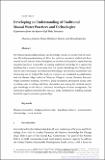| dc.description.abstract | The African traditional knowledges and knowledge systems are on the brink of extinc-
tion. The indigenous knowledge of Africa has not been extensively studied and docu-
mented. In sub-Saharan Africa, the supremacy of colonial education in higher learning
education has been responsible for erasing traditional knowledge. It is against this
backdrop that a team of researchers from the Nyerere Knowledge for Change (K4C)
Hub set out to investigate how traditional knowledges and modern, mainstream ways
of knowing can be bridged. The study we report on was conducted in collaboration
with the Maasai village leaders of Nduruma Village in Arusha, Northern Tanzania.
Village committee meetings, interviews, group discussions, photograph taking, video
recording, voice recording, and direct observation were among the methods used to
gain knowledge on the Maasai traditional technologies of water management. The
information gathered and shared in this case study contributes to building mutually
beneficial expert-community partnerships. | en_US |

